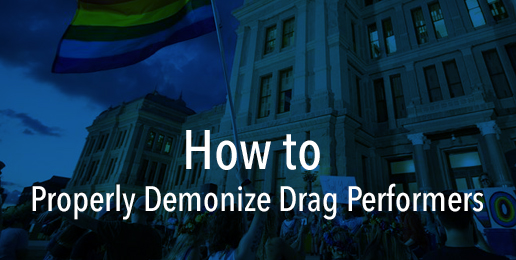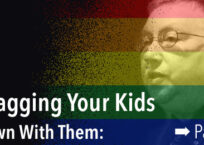
Earlier last month, the American Civil Liberties Union sent out a fundraising email written by the “transgender” “actress” and “drag queen” “Miss Peppermint.”

As ACLU’s Artist Ambassador for Transgender Justice, Peppermint wrote a scathing rebuke of “stale, dusty politicians” who are trying to “take away our freedom to be ourselves,” and urged supporters to contribute to the ACLU’s efforts to fight back.
Let’s look at a couple of Peppermint’s points and see whether they stand up to the scrutiny of reality.
(Note: while the email makes sure to specify that Peppermint’s pronouns are “she, her, hers,” for the rest of this article I will refer to him according to the gender God assigned him before birth.)
Peppermint Point #1:
Thirty-two bills have been introduced in the United States to ban drag. These bills are part of a nationwide movement to demonize queer people – especially Black and Latina transgender women – but let me tell you something: Me and my queer siblings aren’t going anywhere.
Peppermint chastises his opponents for “demonizing queer people.”
Here’s my quick response—yes, bills that ban drag could be said to “demonize” queer people. To borrow Google’s definition, “demonize” means “to portray as wicked and threatening,” so anti-drag laws do in fact demonize queer people in the sense that they acknowledge them to be wicked and threatening to public morality and force them to stop their actions.
However, they do not necessarily demonize these people in the sense of treating them as subhuman or any less valuable in God’s sight. It all comes down to a concept that Peppermint fails to adequately address: the difference between people and beliefs or actions.
All people are created in the image of God, and nothing they believe, say, or do will ever change that.
A cute newborn is created in His image. The local grocery store owner is created in His image. Kim Jong Un is created in His image. The worth of a human depends on this fact which applies to all people everywhere. This is why we ought to never demonize people—even people who believe they are queer—in the sense that we treat them as any less human or worthy of the respect and love we owe to all fellow men.
As a matter of fact, God explicitly chastises us when we curse men who have been made in His likeness (James 3:9).
But the same is not true of beliefs. Unlike people, not all beliefs or actions are created in the image of God. Some align with God’s world, and some contradict it.
The belief that “cyanide is a multivitamin” does not have equal worth to the belief that “cyanide is a deadly poison.” The act of ingesting cyanide does not have equal worth to the act of refraining. While the worth of a person is grounded in the image of God and never varies from person to person, the worth of an idea is grounded in how accurately it describes God’s world, which varies drastically from belief to belief.
And so while we don’t usually use the term “demonize” to describe it, we are definitely called to discriminate among beliefs based on their veracity. As a matter of fact, God explicitly tells us to test all things, hold to the good, and avoid all kinds of evil (1 Thess. 5:21–22).
So does a bill banning drag—such as Tennessee’s Senate Bill 3— “demonize” queer people? Well, sure—in the sense that they portray such people as “wicked and threatening.” Just as a law prohibiting murder “demonizes” murderers by portraying them as “wicked and threatening.”
Public displays of wickedness corrupt public morality. But keep in mind that the reason we “demonize” a murderer is not because we consider him to have lost value as a person, but because he has succumbed to a twisted belief and engaged in a subsequent evil action that deserves a response.
If you ban drag, you do not have to think of drag performers as mini-demons, subhuman, or any less valuable than you. But you should think of their beliefs and actions as dangerous because they are antithetical to the truth.
There may very well be some legislators out there who are pushing for drag bans because they think of drag performers in some way subhuman. But I hope not. Such laws do not demand that attitude. You do not have to dehumanize them in order to condemn their wicked actions.
Peppermint Point #2:
There’s no way we’re going to let these stale, dusty politicians take away our freedom to be ourselves. . . . And look, it’s not only drag that’s under attack. There are over 500 anti-LGBTQ bills moving across the states right now, and most of them target trans kids. That’s right: Grown adults are actually passing laws to bully children – banning kids from playing sports, accessing lifesaving health care, and expressing themselves in class.
As a mentor of mine is fond of observing, this mindset is built on a major contradiction.
Here’s the one question that the transgender movement can’t answer: Does the body matter?
On the one hand, the movement is fundamentally grounded in the idea that your body does not affect who you are. If you have male genitalia but feel female, you are not a man—you are a woman trapped inside a man’s body. The real “you” is grounded in your feelings, your mind, the ethereal part of you, and your body is more or less an accessory that ought to match up with your inner self.
Okay, then, the body doesn’t matter, right?
Well, actually no—the body matters so much that if it does not conform to your inner identity, you are justified in subjecting it to all manner of mangling surgeries and defiling chemical treatments to force it to conform to the false reality it has nothing to do with. As a matter of fact, the body is so important that if anyone forbids you from changing it, they are violating your basic human rights.
So all at the same time, the body is inconsequential to your identity—so inconsequential that you can ignore it when figuring out who you really are—and critical to your identity—so critical that you will go to great lengths to mangle and poison it into the shape that will truly allow you to “be yourself.”
In a sense, Peppermint’s arguments are quite helpful; they help us see a bit more clearly some of the main faulty assumptions that he and likeminded people use to justify their sinful lifestyle and mandate our acceptance of it.
So let’s not be bullied into shutting our mouths.
Should we “demonize” drag performers? Insofar as we acknowledge them to be wicked and threatening, yes.
If they practice public wickedness, they should be stopped.
But insofar as they are humans created in His image, we should never consider them subhuman or mini-demons.
We should continue to pray for them and minister to them as we can.
Always remember: there, but by the grace of God, go I.
























